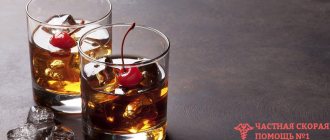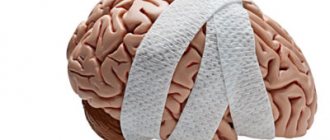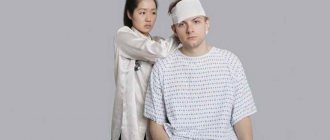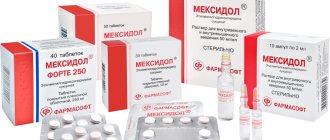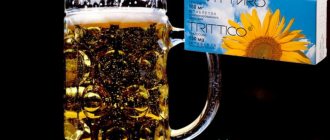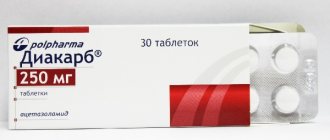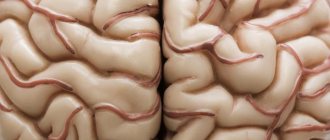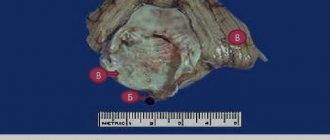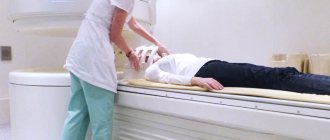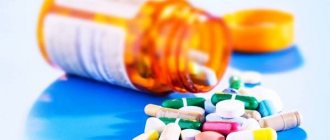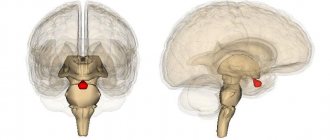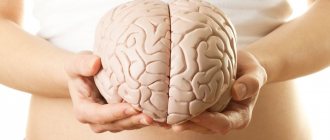Stress and various diseases require a special dietary menu. Nutrition during a concussion is related to the needs of the victim’s body for nutrients and microelements. TBI requires a special regime, expressed in psychological and physical rest. A properly selected diet will help injured cells and tissues recover.
Main signs of a concussion
The first symptom of TBI is loss of consciousness after the impact. Exceptions are elderly people and children. Immediately after a bruise you may experience:
- Frequent breathing.
- One-time vomiting.
- Tachycardia or rapid pulsation.
- Loss of memory regarding the events preceding the injury.
This symptom disappears after some time. The pressure returns to normal, but sometimes it can reach high limits - this happens not only due to the injury, but also the stressful state of the patient. The temperature does not increase during concussion.
After regaining consciousness, the victim experiences the following pathological symptoms:
- headache;
- dizziness;
- feeling of nausea;
- weakness, extraneous sounds in the ears;
- sudden rush of blood to the skin of the face;
- excessive sweating;
- unpleasant discomfort;
- sleep problems.
After injury to the “gray matter,” the patient’s general condition returns to normal within 7-14 days. But migraine attacks and other subjective symptoms can persist for a long time for various reasons.
Is it possible to go to the bathhouse if you have a concussion?
It is believed that bathhouse and good health are synonymous concepts. Yes, the microclimate of the bath room really has a beneficial effect on the general condition of the body. But still, one should not be fanatical about this matter. Due to the high temperature in the steam room, baths and saunas have a number of contraindications. And diseases of the nervous system are just one of them.
People often ask whether it is possible to go to the bathhouse if they have a concussion. And special lovers find many excuses for themselves:
- Quite some time has passed since the injury
- the blow wasn't that strong
- the symptoms have long since gone away
You should know that any changes in the functioning of the central nervous system may lead to disturbances in its functions and changes in the psyche. If you have a concussion, you can go to the bathhouse only if you are not responsible for your health. While visiting the steam room, general blood circulation increases. But it is precisely in the brain that it decreases. And if you consider that the functioning of the brain is already impaired, then we can conclude that nothing good will come of this.
Is it possible to go to the bathhouse if you have a concussion, if you treat it very carefully? If more than a year has passed since the head hit, then you can really visit, for example, a sauna for a short time. There the temperature regime is not much more gentle.
You can even get positive aspects for rehabilitation:
- tension in the mental and muscular systems decreases;
- psychoneurological tension decreases;
- psychological comfort sets in;
- excitability decreases;
- a feeling of cheerfulness comes;
- headaches go away.
Concussion
Is it possible to go to a bathhouse or sauna if only a few weeks have passed and how can you harm yourself:
- disorders of the autonomic system;
- headaches only get worse;
- sleep disturbances may occur;
- memory disorders occur;
- attentiveness decreases.
Also, you should know that if the question arises whether it is possible to go to the bathhouse with a concussion, then it is important to consider that high temperature is a stressful environment for the human body. Therefore, you can visit a bathhouse or sauna after a concussion only if sufficient time has passed for rehabilitation.
It is also important to adhere to the following recommendations:
- take a shower before the steam room;
- reduce your stay in the steam room to a minimum;
- an hour before the bath, eat well;
- do not drink a lot of liquid;
- do not drink alcohol;
- do not smoke for some time before the bathhouse and during its visit;
- in the steam room, breathe only with your mouth open;
- do not water the stones during sunset;
- avoid contrasting temperatures;
- Allow your body to cool down after the bath for half an hour.
The most important thing is to be able to listen to your body. If there are even slight sensations of weakness, the question of whether it is possible to go to the bathhouse during a concussion should not arise at all. Giving additional stress to a weakened body is extremely unwise.
In general, baths should be visited with extreme caution and in the absence of contraindications. Especially with illnesses and head impacts. After all, no one knows how a traumatized brain will behave.
Useful products for bruises
When diagnosing a “gray matter” injury, the patient is prescribed rest, bed rest and nutrition for a mild concussion, including carbohydrate and protein foods. The treatment menu for TBI is reminiscent of the famous Atkins diet.
All meals included in the diet should include:
- Boiled.
- Fresh.
- Steamed products.
- Vegetables, meat, fish, baked in the oven.
You will have to completely give up smoked meats, sweets and fried foods. During the recovery period, you should not overload your body with food. The diet should contain more protein as well as carbohydrates. Vegetable fats (olive oil) are used for cooking.
During treatment of a bruise, it is recommended to take B vitamins, which have a beneficial effect on the nervous system. These beneficial substances are found in foods such as:
- asparagus, liver;
- seafood;
- for concussions, eat eggs and legumes;
- nuts, buckwheat;
- lean fish, dairy products.
To quickly absorb an element of group B, you should supplement your diet with food containing iron: spinach, legumes, various cereals, meat.
It is recommended to eat chicken and turkey every day - their fillet contains lecithin, which has a beneficial effect on the brain center. This substance is also present in pork liver and soy. It is better to supplement the diet with low-fat vegetable soups, beetroot soups, solyanka, borscht - anything that speeds up the digestion process.
The body needs to be given maximum support; it requires a lot of minerals and nutrients contained in fruits and fresh vegetables.
The victim’s menu should be selected taking into account the medications prescribed by the neurologist. If the patient takes diuretics, his diet should contain foods rich in potassium. It can be:
- Raisins, dried apricots.
- Baked potato.
- Prunes are useful for concussions.
- Dairy products.
- Legumes, nuts.
It is very important that the restorative diet contains a large amount of fermented milk and dairy foods - it contains potassium, which has a positive effect on the body's defenses, metabolic processes, and digestion.
Ascorbic acid will help cope with the stress experienced by a victim who has received a blow to the head. To do this, the diet should be supplemented with fresh cabbage, citrus fruits, rose hips, bell peppers, and spinach.
Magnesium present in legumes and cereals will help restore the functionality of the “gray matter” and protect the patient’s body from stress; the victim’s menu should include milk-based porridge.
Constant consumption of lean fish compensates for the lack of Omega-3 acids, which improve the functioning of the central nervous system (beneficially affects memory and restores brain activity).
The performance of the “gray matter” is improved by glucose, which is part of dried fruits and honey. The mixture of beekeeping product and nuts is useful not only for sick people, but also for healthy patients to improve brain activity.
Read also: Is it possible to drink Liv 52
Foods you should avoid eating
Experts agreed that it is necessary to exclude some foods from the daily menu in case of a concussion of varying severity. The list of main dishes that you should avoid if you have a concussion includes:
- foods high in fat, which impairs blood flow;
- various seasonings and spices are contraindicated for concussion: they irritate the central nervous system;
- sweets, buns and various confectionery dishes;
- when the “gray matter” is shaken, it is not recommended to eat salty, spicy food;
- alcoholic drinks: they not only contribute to the destruction of neurons, but also have a negative effect on the blood circulation of the brain and nervous system;
- coffee cocktails, strong tea drinks: increase blood pressure.
All of these products can significantly worsen the patient's condition during the recovery period after an injury.
A proper diet for mild concussions is an integral part of a comprehensive recovery. It should be realized that adequate therapy and compliance with all the doctor’s advice leads to the recovery of the victim. It is important not only drug treatment, but also good nutrition, a positive attitude, rest and walks in the fresh air.
Moderate TBI requires treatment in a hospital setting, where the patient is constantly under the supervision of doctors. Only this approach guarantees complete recovery of the body.
Smoking with osteochondrosis and other joint diseases
Due to spasm of the vascular walls, the body suffers from a lack of oxygen and nutrients, this affects the internal organs and the spine. But, if you give up the bad habit and try to adhere to a healthy lifestyle, you can get rid of the pain caused by osteochondrosis.
What does smoking lead to?
When inhaling tobacco smoke, the smoker feels relaxed, which can be compared to euphoria. Sometimes smoking allows you to cheer up, because, thanks to nicotine, adrenaline is released into the blood. But such short-term pleasure is expensive, since literally the entire body suffers:
- Smoking primarily affects the respiratory system, since tobacco smoke irritates the surface of the upper respiratory tract. Over time, the area located between the larynx and lungs will begin to become inflamed, becoming chronic. A similar condition can also occur in passive smokers.
- Changes also affect the cardiovascular system. After smoking, blood pressure usually rises to 10% of normal. Although this phenomenon is short-term, with regular and frequent smoking, due to pressure surges, the heart experiences a greater load. The structure of the blood vessels also changes: they are constantly in a state of spasm, and the outer cellular layer of the vascular walls simply dies.
- Organs of the digestive system. The vessels of the gastric mucosa also begin to contract, which leads to a lack of nutrients and oxygen, since they do not reach the stomach well due to spasmodic vessels. This often leads to a decrease in local immunity, and, as a result, gastritis or ulcers appear.
The effect of smoking on the condition of the spine
The musculoskeletal system of smokers is also susceptible to pathological processes:
- Neurological paroxysms may occur.
- Lack of oxygen in tissues.
- Blood counts worsen.
- The pain threshold decreases.
Due to regular inhalation of tobacco smoke, intervertebral discs are also damaged, as they are left without nutrients for a long time. This contributes to the fact that the tissues begin to degenerate, and osteochondrosis of the cervical spine
, often pathology occurs in the thoracic region. But, if you abruptly quit the bad habit, then literally after seven days you can already observe a positive effect: blood circulation is normalized, reducing pain. If at the same time you start eating right and introducing physical activity into your life, the result will be even better.
Is it worth smoking if you have osteochondrosis?
Nicotine is a poison for blood vessels, since under its influence their walls wear out greatly over time. Sometimes a person smokes to relieve pain, and cigarettes really help, but not for long: as long as the short-term relaxing effect lasts.
Smoking causes the walls of blood vessels to contract, but they nourish the muscles, spine, and internal organs. And the lack of this nutrition will lead to an exacerbation of degenerative processes in osteochondrosis. This means your back will hurt more. Therefore, if it is not possible to suddenly quit smoking, then you can try to reduce the number of cigarettes you smoke at a time when the disease worsens.
Is there a connection between smoking and the development of spinal diseases?
It is known that back in the 20th century, smoking was considered a risk factor for disorders of the musculoskeletal system. Scientists from Norway conducted an experiment in which they were able to prove the relationship between inhaling tobacco smoke and a decrease in bone density.
It is also known that those people who smoke often develop physical inactivity. They tend to drink alcoholic beverages, do not watch their diet and do not exercise. And a woman who smokes goes through menopause earlier. All this contributes to the development of disorders in the musculoskeletal system.
According to the research conducted, it can be stated that:
- If a person smokes a lot and for a long time, then in old age his bones will have low density, which means there is a high risk of fractures.
- Fractures in smokers take much longer to heal than in those who do not smoke.
Another study, this one from Chicago, found that teenagers and younger children who smoke have an increased risk of having poor bone mass in the future. A woman who smokes produces less estrogen, which causes bone loss.
Also, smoking has a bad effect on arthrosis: the cartilage in the knee is more susceptible to wear in this case, about twice as much. The fact is that smokers have carbon monoxide in their blood, and due to inhalation of tobacco smoke, cartilage cells experience an inhibitory effect and oxidative stress occurs.
The likelihood of developing rheumatoid arthritis doubles, but much depends on how long a person smokes.
Due to the effects of nicotine and carbon monoxide, the nutrition of the intervertebral discs is disrupted - they become less elastic, or cracks may even appear. This condition is dangerous because it leads to serious consequences, such as herniated intervertebral discs, especially if a person is diagnosed with cervical or thoracic osteochondrosis. In this case, a sharp and severe pain syndrome occurs, localized in the neck or ligaments.
Of course, smoking negatively affects the musculoskeletal system, limiting a person’s mobility and contributing to the deterioration of his health.
Author: K.M.N., Academician of the Russian Academy of Medical Sciences M.A. Bobyr
Alcohol abuse when the “gray matter” is affected
With a concussion, the clinical picture is similar to the symptoms of severe alcohol intoxication. If the victim abuses alcohol-containing cocktails during therapy, there is a risk that signs of the pathological syndrome will recur. The patient may experience hysterical attacks, hallucinations, and irritability.
Due to a small amount of alcohol consumed after a blow to the head, mental disorders and delirium tremens are observed, which can appear even after a glass of beer.
When the “gray matter” begins to recover after the blow, the “recreational” cocktails cause attacks of headaches, hypertension, and sudden mood swings. Symptoms of a concussion intensify, and swelling of the brain is sometimes observed. As a result, the patient may lose consciousness or fall into a coma. Drinking alcohol during therapy often provokes a stroke.
The traumatic factor of alcohol and cigarettes after brain injury
From the time when a person first starts drinking strong drinks and smoking cigarettes, he may not yet understand how great an evil alcoholism and smoking are. If at first it is a simple hobby, then later such habits easily develop into more complex stages of alcoholism or tobacco addiction. When starting from 1 - 2 glasses or cigarettes of seemingly harmless low-alcohol champagne or wine, a person begins to drink it more often, and smoke accordingly more.
As a result, a person who drinks or smokes not only develops diseases of the internal organs, but, most importantly, his brain is exposed to the destructive effects of alcohol and tobacco. After all, it is after this that all the signs and other ailments associated with poor health appear that accompany alcoholism and cigarette smoking.
To read: Symptoms of non-convulsive epilepsy and other types of seizures
There is also no exception to how many years have passed since the time when the patient first started drinking alcohol or smoking.
Even a moderate drinker and smoker increases the risk in old age of having a history of mental problems due to beer consumption. This probably happens due to a decrease in the volume of the brain layer due to the negative effect of alcohol and tobacco on the state of the brain. Especially after a concussion, this factor begins to accelerate, reducing the area of healthy tissue and increasing the radius of dead cells.
Traditional medicine
Non-traditional methods of treatment for injury should be used only as prescribed by a doctor, so as not to provoke the development of various complications. To eliminate pathological symptoms of a concussion, soothing decoctions are used based on:
- Ivan-tea.
- Melissa.
- Eleutherococcus.
- Medicinal valerian root.
As well as other medicinal herbs that have a calming, sedative effect on the nervous system during a concussion.
The patient must follow a special diet after a TBI after completing hospital treatment for a long time. It is necessary to gradually include familiar foods in the diet; it is better to avoid spicy and salty foods. You should not get carried away with sweets. In case of a concussion, the victim should be observed by a doctor until the central nervous system and general condition are completely restored.
When a concussion occurs, brain cells are not damaged. Trauma disrupts normal neuronal function. During therapy, the patient needs rest. Nutrition for concussion is an integral part of therapeutic measures.
What to do if you have a concussion
A concussion is a serious injury. Bystanders are advised to immediately call medical help for the victim. Before the doctors arrive, the patient must be placed on his side, be sure to put something under his head if he is unconscious. This will help prevent possible asphyxia, which occurs after an injury during attacks of nausea. A cold compress, which can be made from ice, will be a good help for the victim. Several layers of fabric will help to avoid skin burns .
After diagnosing a concussion, doctors prescribe bed rest for 5 days. If the condition improves, an additional 5 days of rest and treatment at home. Throughout the course of treatment, it is necessary to take medications that help normalize blood circulation in the brain. The most popular drugs to achieve this goal are Cavinton and Encephabol. The following means are used in treatment:
- analgesics to relieve headache symptoms - Baralgin and its analogues;
- non-steroidal anti-inflammatory drugs;
- antiemetic medications – Metoclopramide and its analogues;
- means for relieving dizziness - drugs from the Papaverine group
In case of serious sleep disturbances and the appearance of seizures, tranquilizers and medications from the barbiturate group are prescribed.
Alcohol is strictly prohibited during concussion treatment. Ethanol reacts with the drugs used, causing consequences such as stroke and cerebral edema. It is not recommended to drink alcohol even after completion of treatment , since ethyl alcohol negatively affects brain function.
Why does a concussion require a diet?
Brain injury causes disruption of the central nervous system. The patient suffers from headaches, nausea, vomiting, and sleep dysfunction. Intense catabolic reactions occur in the affected brain, accompanied by a high need for proteins and glucose.
Since during a concussion, the brain requires a significant amount of energy and building material for cells , with poor nutrition, protein deficiency can develop in the body, manifested in weight loss and increased severity of clinical symptoms of damage to the nervous system.
Therefore, nutrition during relief from symptoms of traumatic brain injury should include easily digestible protein and carbohydrate foods.
Consequences of a concussion
You can get a traumatic brain injury at home, at work, in a car accident, or by slipping while walking. The consequence may be a bruise or concussion. These injuries are different: with a bruise, swelling develops; with a concussion, this pathological process is not observed. The following health disorders are diagnosed :
- increased intracranial pressure;
- deterioration of vascular functionality;
- a person experiences attacks of nausea and vomiting;
- the interaction between cells, areas and hemispheres is disrupted;
- problems with vision arise – double vision, “spots” appear;
- functional activity is impaired.
After an injury, a person becomes inhibited and memory problems may occur. A sign of severe injury is loss of physical coordination, concussion with loss of hearing and other senses . The patient, lying motionless in bed, may feel as if his body is in motion.
What to eat if you have a concussion
It is beneficial for the patient to eat easily digestible food, fresh or steamed. You can't eat too much because it overloads the nervous system. It is useful to eat the following dishes:
- Foods rich in thiamine or riboflavin. They improve a person’s condition and normalize the functionality of the brain. They are found in nuts, pork, legumes, asparagus , shellfish, eggs, buckwheat, fish and dairy products.
- B vitamins are absorbed even better if the body does not have enough iron. Sources of this microelement are buckwheat and oatmeal, wheat flour products, some vegetables, liver, and game meat.
- It is beneficial for patients to eat foods containing lecithin . It is present in egg yolk, soy, liver.
- Broths, pickles, and beet soups help improve digestion.
- To saturate the body with vitamins and microelements, you need to eat enough greens, vegetables and fruits .
- If the patient is taking diuretics, the menu should include food enriched with potassium. These are dried apricots, dairy products, nuts, raisins, and kelp.
- There should be fish . It contains polyunsaturated essential acids.
Read also: Vomiting bile after alcohol in the morning
- Eating foods with ascorbic acid strengthens the body and helps it fight stress. This vitamin is found in large quantities in rose hips, currants, sweet peppers, lemons and oranges, apples, spinach, and vegetables.
- Magnesium is found in kelp, legumes, and nuts . This substance is necessary for the smooth functioning of the nervous system.
Healthy drinks
A concussion is associated with enormous stress. Therefore, to support brain function, you need to include drinks from medicinal plants in your diet. They are prepared and consumed like regular teas. You can drink them after permission from a neurologist. Doctors recommend that patients take medicinal decoctions.
Soothing tea . It is prepared from lemon balm, fireweed, valerian root, birch leaves and St. John's wort. Per liter of medicine you need 3 tablespoons of the indicated components, which are selected in equal quantities. You need to consume it half a glass four times a day for 14 days.
For concussions, it is recommended to consume elecampane tea with myrtle . For 2 cups of boiling water, take a tablespoon of the mixture. You need to drink a glass of it twice a day.
For insomnia, it is recommended to include mint and cinnamon . A delicious soothing infusion is prepared from them. To get it, you should take a tablespoon of the indicated components and pour a liter of boiling water over them. Tea is infused in a thermos. Drink it half a glass up to 6 times a day.
To relieve the symptoms of a concussion tea is prescribed from a collection of medicinal plants , which are taken in equal proportions: lemon balm, plantain leaves, nettle, mother grass, clover (flowers), mullein, rose hips, wild rosemary, currant branches.
To prepare the drink, brew 2 tablespoons of the mixture in a liter of boiling water using a water bath. Take it three tablespoons three times a day. If the general condition worsens, the portion of the drink increases.
What is harmful during a concussion?
In case of a brain injury, alcohol is primarily harmful. Neurologists advise excluding it for at least a year. No alcohol-containing drinks should be present in the diet, because they cause excessive stress on the brain.
During recovery from injury (at least six months), the following are strictly not recommended for use:
- Salty and spicy food. Eating these foods causes disruption of water and salt balance.
- Smoked foods, since they provoke stress on the brain affected by a concussion. Fried food has the same effect.
- During the period of treatment after a concussion, you should avoid foods based on margarine and mayonnaise.
- Dark chocolate with a high cocoa content should be avoided. Confectionery products are best consumed in reasonable quantities.
- If you have a concussion, it is important to give up strong tea and coffee. The caffeine contained in these drinks increases pain in the head and increases blood pressure.
A closed traumatic brain injury, in which the substance and structure of the brain is not damaged, but only the functioning of neurons is disrupted, is called a concussion. Proper nutrition during a concussion is an important component of comprehensive therapy to restore health.
For such an injury, it is not necessary to hit or fall hard. Young children can get a similar illness due to strong shaking or heavy rocking. Adults suffer injuries of this kind due to contact of the head with a hard surface or blunt objects, which most often occurs during a fall.
Why you shouldn't drink alcohol after a concussion
Traumatic brain injury and the conditions under which it occurs are a stressful situation for any person. Alcohol is a traditional stress reliever for many. They try to dull the uncomfortable and painful state with a glass of cognac or a shot of vodka. Is it possible to drink alcohol if you have a concussion and what are the possible consequences of drinking alcohol after an injury?
Ethanol and its breakdown products, after absorption, enter the bloodstream and enter the brain. These chemicals negatively affect the functioning of the brain and blood vessels. In contrast to the popular belief that blood vessels dilate, they narrow under the influence of psychoactive substances. As a result, brain cells receive less nutrients and oxygen for their vital functions. There are spasms and severe headaches. Taking alcohol during a concussion, a person provokes hypoxia and aggravates his serious physical condition.
As a result of intoxication of the body after drinking alcohol, oxygen starvation of the brain occurs. Severe dizziness occurs and the victim loses consciousness. With severe injuries, convulsions may occur. The reason for these phenomena is the ability of ethanol to agglutinate red blood cells. Under the influence of ethyl alcohol, these blood cells stick together, increase in size, move slowly and clog small vessels . In areas where blood has stopped flowing to the brain, cell death is observed. This leads to impaired brain function. If you drink alcohol during a concussion, the consequences of the injury will become more severe.
To improve brain function, it is necessary to restore normal nutrition to its cells and the elasticity of blood vessels. This requires medication and complete rest. Drinking alcohol slows down the recovery process, and in severe cases, stops it completely. Cigarette smoke, strong tea and coffee have a similar effect. Biologically active substances in their composition stimulate vasoconstriction , which causes spasms. For this reason, not only alcohol is prohibited after a concussion, but also a number of products that are harmful to health. These recommendations must be strictly followed.
Signs of injury
Since a concussion occurs as a result of a traumatic situation, and its symptoms are pronounced, the disease can be recognized without much effort. Having received a blunt injury, as a rule, adults lose consciousness, after which they experience memory gaps and several other characteristic symptoms:
- clouding of consciousness;
- feeling of nausea;
- restless sleep;
- headache.
It is more difficult to determine the presence of a concussion in young children, since loss of consciousness does not occur in them, and other signs are not much different from other pathologies:
- restless sleep;
- tearfulness;
- regurgitation during feeding.
The situation is further complicated by the fact that the signs of more complex traumatic brain injuries (brain contusion) in children appear in exactly the same way.
Any injury, including concussion, leads to the development of catabolic reactions. This means that the need for proteins and amino acids increases significantly. If the necessary protein nutrition is missing, a person loses weight and his general condition worsens. In especially severe cases, protein structures in the body are affected.
Why nicotine is harmful to the brain
Smoking and cerebral blood vessels are our worst enemies. Nicotine contained in tobacco smoke causes vasoconstriction. At the same time, the amount of nutrients and oxygen entering the neurons of the brain sharply decreases. Neurons die from oxygen starvation. This increases the likelihood of developing Alzheimer's and Parkinson's diseases.
But neuronal degeneration is only one of the consequences of how smoking affects the blood vessels of the brain. The most dangerous result of many years of inhaling tobacco smoke is cerebral ischemia and stroke.
When blood vessels narrow, the heart begins to work at an accelerated pace. The heart rate increases by 20-30 beats per minute. Increased pressure makes blood vessels less elastic. Over time, irreversible damage appears in the vessels - microcracks. Protein and lipid metabolism is disrupted, resulting in cholesterol accumulation on the walls of blood vessels. This disease is called atherosclerosis.
Treatment
The goal of therapeutic therapy is primarily aimed at stabilizing cerebral circulation, as well as improving the general well-being of the patient.
In the first case, drugs are prescribed to improve the tone and nutrition of cerebral vessels, as well as diuretics. The selection of drugs directly depends on the severity of the injury and the presence of complications.
Stabilization of the condition is based on the elimination of symptoms such as dizziness, anxiety, headaches, insomnia, etc. In this case, sedatives, painkillers, and sometimes sleeping pills are used.
What's the forecast?
If the patient follows the doctor’s recommendations and instructions, then everything ends in a complete recovery. Residual symptoms such as dizziness, fatigue, and insomnia may persist for several months. Then they gradually decrease until they disappear completely.
If there are concomitant pathologies and medical recommendations are not followed, as well as with severe injuries, there may be complications in the form of VSD and even epileptic seizures, especially if alcohol habits are present.
Nutrition
There is no specially designed diet for concussion. However, proper nutrition is a good helper for a quick recovery and restoration of the body’s strength. Vegetables and fruits, steamed or boiled foods are beneficial. It is necessary to refrain from salty foods, fried and fatty foods, strong coffee, chocolate, and tea. The diet should be followed depending on what concomitant diseases are present and what drugs are being treated. When taking diuretics, for example, it is important to supplement treatment with foods that contain potassium.
If you are injured, you need to rest more and eat easily digestible food. This includes fresh, boiled or steamed foods. Since movement is limited during this period, overeating should be avoided: this way the body will not be overloaded.
Symptoms after a head concussion
Once a person suffers a concussion, they are hospitalized for approximately one week for treatment. Where he is prescribed strict bed rest for 48-72 hours or more, depending on the nature of the severity of the injury. After this period, if the victim’s condition improves, he is discharged with recommendations to return for treatment for about 14 more days.
What symptoms may bother a victim of a head injury:
- Constant aching pain in the head.
- Deterioration of concentration and memory processes.
- The presence of unconscious fear.
- Bad dream.
- Increased photosensitivity.
To fully restore brain activity after a concussion, a patient undergoing home treatment after discharge from the hospital requires strict bed rest. When he is also contraindicated to drink alcohol and use tobacco products, eat any products made on the basis of carcinogens. He also needs to give up any type of mental work.
This is the same period during which the brain needs a certain period of time to restore impulse connections between cells (neurons). After all, a concussion is a serious stressful situation for the brain. Therefore, you should not neglect this, much less refuse treatment, assuming that alcohol will help speed up the rehabilitation process if used together with prescribed medications. On the contrary, even in small doses, alcohol has a detrimental effect on the condition of healthy or damaged cells.
Products that are beneficial
B vitamins benefit the body weakened by injury. They are found in the following foods: egg yolk, oysters, liver, legumes, buckwheat, pork, nuts, potatoes, fish, whole grain bread, milk.
In order for vitamins to be better absorbed, it is necessary to include iron-containing foods in your diet: chicken, legumes, spinach, barley, wheat, liver, oatmeal. Foods such as poultry, soy, liver and eggs also contain lecithin, which promotes normal brain function.
All microelements important for the body are found in vegetables and fruits.
Calcium, which improves metabolic processes and strengthens the immune system, is found in dairy products.
Fish provides the body with Omega-3 fatty acids, so it should also be included in a regular diet.
To restore the body's strength after stress, foods with vitamin C are required. Citrus fruits, spinach, viburnum, black currants, and cabbage contain it.
Magnesium improves brain functioning and protects it from stress. To obtain it, it is important to eat oatmeal, legumes, seaweed, nuts, millet, and buckwheat.
For smooth functioning of cells, the body needs glucose, which is present in fruits and dried fruits.
Important fats for humans are found in nuts and olive oil, so doctors strongly recommend consuming these products if you have a concussion.
Products that are harmful due to concussion
Doctors are unanimous in their opinion and advise excluding the following foods from the diet during a concussion:
- fatty foods, which not only impair blood circulation in the brain, but also lead to gaining extra pounds;
- various spices and seasonings: they are irritants to the nervous system;
- confectionery and various sweets;
- spicy and salty foods;
- alcohol (strictly prohibited in case of injury): it not only destroys neurons, but also has a negative effect on cerebral circulation and the central nervous system;
- strong coffee and tea: they contribute to increased blood pressure.
All of the above products can cause serious harm in case of a concussion. During this period, it is necessary to be especially vigilant about what and in what quantity enters the body.
Proper nutrition is an integral part of injury recovery. It is important to remember that only comprehensive treatment and compliance with all recommendations leads to a quick and complete recovery of the patient. Not only medications and diet are important, but also a good mood, a positive attitude, fresh air and, of course, rest.
A severe concussion requires drug therapy in a hospital, where the patient is under full medical supervision. Only this method guarantees recovery and the absence of any complications.
When can you drink alcohol if you have a concussion without consequences?
After the injury and the recovery process, the victim, in most cases, continues normal life . As a result of the incident, few people decide to change their habits. Planned events, holidays, and celebrations are traditionally accompanied by strong drinks. After experiencing a concussion, can I drink alcohol, in what quantities and after what time? These questions become relevant for those who have suffered a traumatic brain injury.
Doctors with many years of experience recommend that if you have a history of a diagnosis such as a concussion, you should give up such a habit as drinking alcoholic beverages. There is no guarantee that even a small dose of alcohol will not have a negative effect on the central nervous system. If it is not possible to give up the habit for various reasons, then you can take a light dose of alcohol six months after completing the course of treatment . It is not recommended to do this before.
How much and what drinks can you drink after an injury? It is recommended to consume only high-quality alcoholic drinks from trusted manufacturers. Alcohol should not be purchased from random sellers; bottles must have excise stamps confirming the quality of the product. You can only drink good cognac or red wine. These drinks in small quantities have minimal effects on the body.
What should be the dose of alcohol? The minimum possible, and the intervals between portions are as large as possible. This will allow a person to independently monitor changes in his condition and feel a possible deterioration in his health. Thanks to control, it will be possible to consult a doctor in a timely manner, neutralize the alcohol taken and prevent possible negative consequences.
Neglecting the recommendations of doctors is unacceptable , this can result in the following consequences:
- constant headaches;
- progressive cerebral circulatory disorders;
- severe cramps;
- chronic inflammatory processes.
People with a long history of drinking alcoholic beverages are at maximum risk. Alcohol abuse leads to a situation where a person cannot independently give up his habit. Chronic alcoholics experience severe damage to various parts of the brain, and a concussion aggravates this condition. For this category of victims, it is recommended to completely limit access to alcohol during treatment and after its completion.
The course of treatment takes place at home. Chronic alcoholics require inpatient treatment. This allows you to fully control the order of taking medications and compliance with the general regimen. At home, breakdowns and consumption of alcoholic beverages are possible. This will lead to a drop in brain activity and will cause regular nervous disorders and mental decomposition of the individual.
